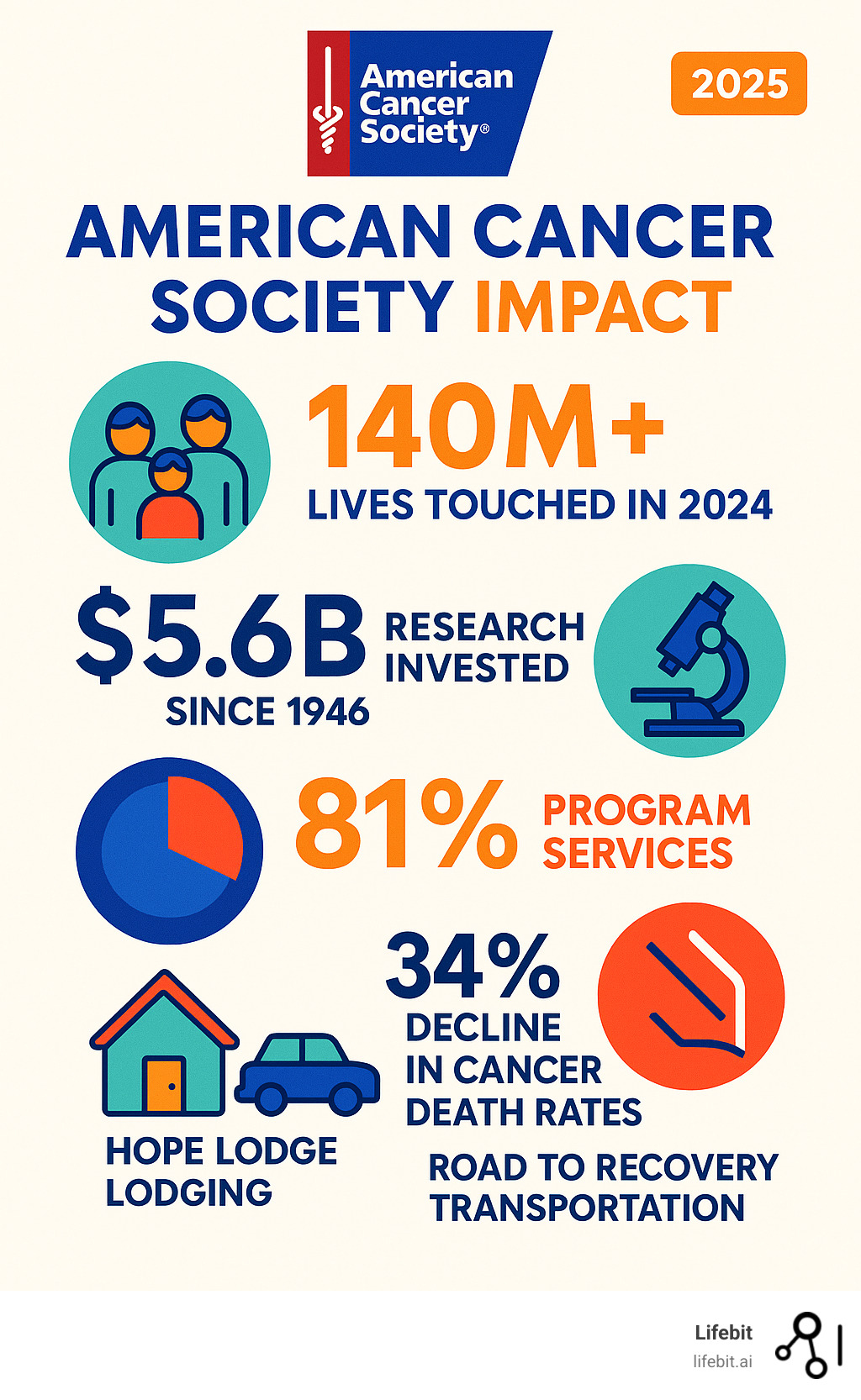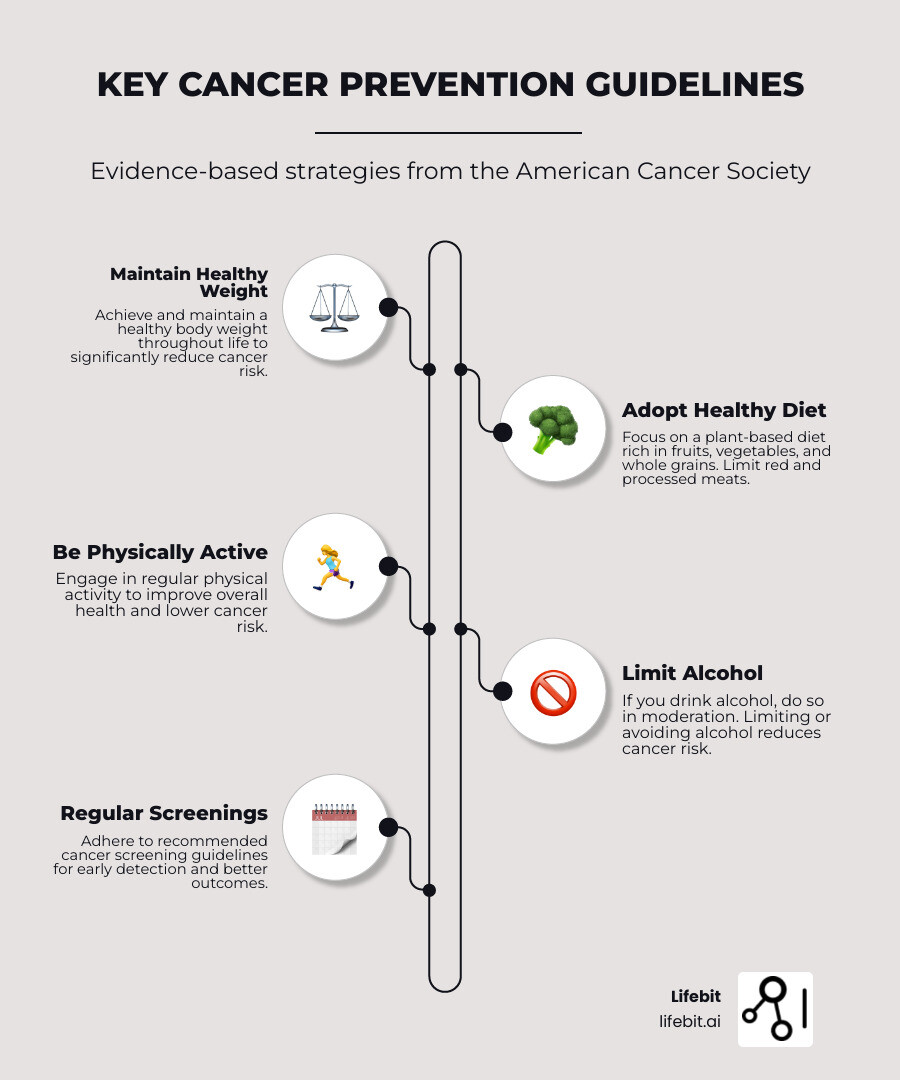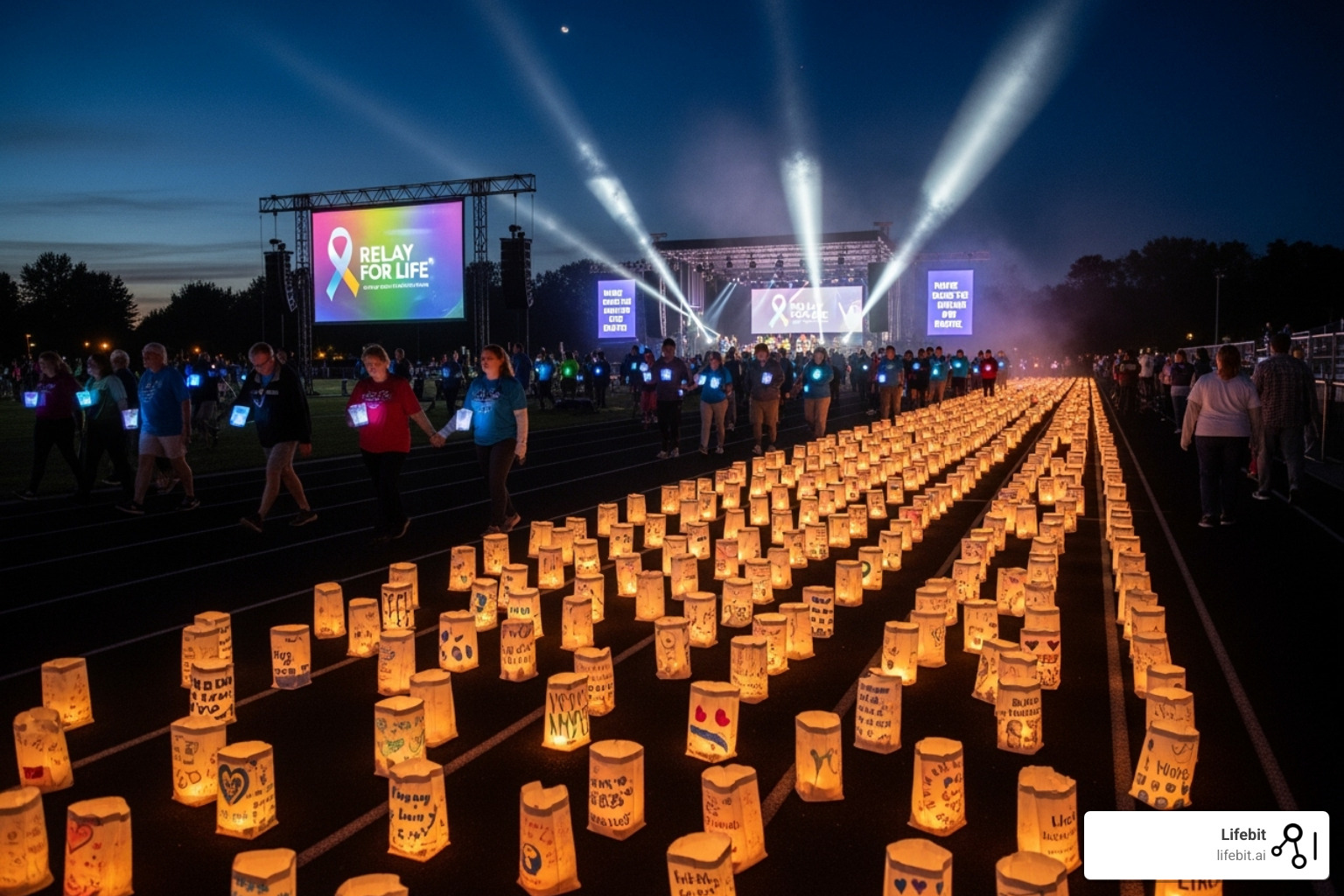Join the Fight: Your Guide to the American Cancer Society

American Cancer Society: Fight, 34% Decline, Impact
Why the American Cancer Society Leads the Fight Against Cancer
The American Cancer Society is the leading U.S. cancer-fighting organization, working to end cancer as we know it for everyone. Founded in 1913, this nonprofit powerhouse touches lives through three core pillars:
- Research: Largest non-government funder of cancer research ($5.6B invested since 1946)
- Patient Support: Free lodging, transportation, and 24/7 helpline services
- Advocacy: Policy changes that have contributed to a 34% decline in cancer death rates since 1991
Key Impact Statistics:
- 140M+ lives touched in 2024
- 18M+ cancer survivors alive in the US today
- 2.8M+ cancer screenings provided in underserved communities
- 1.5M volunteers nationwide
The American Cancer Society operates with remarkable efficiency, allocating 81% of expenses directly to program services while maintaining top ratings from charity watchdogs like Charity Navigator (99/100 score).
Whether you’re seeking patient support, volunteering, or understanding cancer prevention, the ACS provides comprehensive resources backed by over a century of expertise.
I’m Maria Chatzou Dunford, CEO and Co-founder of Lifebit, where we power large-scale biomedical data analysis for organizations advancing cancer research. Through my work in computational biology and genomics, I’ve seen how organizations like the American Cancer Society drive breakthrough findies through data-driven approaches to understanding and treating cancer.

Quick look at american cancer society:
- Cancer Moonshot
- Defense Health Agency
A Century of Progress: The History and Mission of the American Cancer Society
In 1913, cancer was a feared disease whispered about in hushed tones, with many believing it was a death sentence. Into this world of fear, a brave group of doctors and business leaders formed the American Society for the Control of Cancer (ASCC). Their mission was to drag cancer out of the shadows and into the light of public awareness.
One of the most inspiring chapters in this early history belongs to the Women’s Field Army of the mid-1930s. These remarkable women weren’t just volunteers – they were warriors in the truest sense. Dressed in crisp military-style uniforms, they marched through neighborhoods, knocked on doors, and spread the word about cancer prevention and early detection. Their impact was nothing short of extraordinary, growing the volunteer base from 15,000 in 1935 to an impressive 150,000 by 1938.
The organization’s evolution continued in 1944 when it officially became the American Cancer Society. This wasn’t just a name change – it marked a fundamental shift toward a more comprehensive approach to fighting cancer. The new ACS didn’t just want to control cancer; it wanted to conquer it through research, patient support, and advocacy.
Throughout the decades, the American Cancer Society has consistently stayed ahead of the curve. In 1965, they successfully advocated for the first U.S. Surgeon General’s warning on cigarette packs – a game-changing moment in public health. More recently, in 2013, they reorganized their national and local chapters to work more efficiently, and in 2023, they even sold their Atlanta headquarters to accept a hybrid operational model that keeps them agile and effective.
Today, the mission remains crystal clear: to end cancer as we know it, for everyone. It’s a bold vision that drives every research grant, every patient support program, and every policy advocacy effort. This isn’t just about treating cancer – it’s about creating a world where cancer can’t thrive.
The organizational evolution from a small group of concerned citizens to today’s powerhouse shows how far we’ve come. Yet the heart of the mission remains the same: turning fear into hope, silence into action, and despair into determination.
For those curious about the full journey, you can explore A Look at Our History to find even more fascinating details about how this incredible organization came to be.
The Three Pillars of the ACS: Research, Advocacy, and Patient Support
The American Cancer Society tackles cancer with a powerful three-pronged strategy: “Findy,” “Change,” and “Support.” This is a coordinated attack from every angle: making groundbreaking findies in labs, changing life-saving laws, and supporting families in need.
What makes this approach so effective? It’s the way these three pillars work together. Research findings inform our advocacy efforts, policy changes create better conditions for patients, and patient experiences guide our research priorities. This integrated strategy has helped us allocate an impressive 81% of our total expenses directly to program services in FY2023, ensuring your support makes the maximum impact.

Fueling Findy Through Cancer Research
When it comes to cancer research funding outside of government, the American Cancer Society leads the pack. Since 1946, we’ve invested a staggering $5.6 billion in research that has changed the world. Here’s something that really puts this in perspective: 53 Nobel laureates have received ACS funding during their careers. That’s not just impressive – it’s proof that we know how to spot game-changing science.
Our research isn’t just happening in one lab somewhere. We’re conducting massive population science studies that help us understand what causes cancer and how to prevent it. Take our VOICES of Black Women study – it’s set to become the largest behavioral and environmental study of cancer risk in Black women in U.S. history. We’re following over 100,000 participants for 30 years, managing 11 terabytes of data from 1.5 million participants to understand and address cancer disparities.
But we don’t stop there. Through our Extramural Findy Science grants, we fund brilliant researchers across the country who are working on the next breakthrough. Whether it’s a small university lab or a major medical center, if the science is promising, we’re there to support it. This approach ensures that innovation happens everywhere, not just in a few select places.
For deeper insights into how data analysis drives better outcomes for cancer patients, check out Oncology Data Analysis for Patient Outcomes.
Championing Change Through Advocacy
Great research means nothing if people can’t access the treatments and prevention measures that could save their lives. That’s where the ACS Cancer Action Network (ACS CAN) comes in – our advocacy arm that fights for policies that protect lives.
The numbers tell an incredible story. Thanks to our persistent advocacy efforts, 62.3% of the U.S. population now lives under smoke-free laws that protect them from dangerous secondhand smoke. But the real victory? Our combined efforts in research, prevention, and advocacy have contributed to a remarkable 34% decline in cancer death rates from 1991 to 2022. That translates to nearly 4.1 million cancer deaths prevented.
We’re not just celebrating past wins, though. Right now, we’re fighting hard for policies that expand access to affordable, quality healthcare. We’ve seen 33.5 million people benefit from expanded health insurance access, and we’re working to protect and extend these gains. When proposals come up that could strip away affordable insurance from millions, we speak up loudly. When there’s a chance to extend improved tax credits that help people afford care, we’re there pushing for it.
Want to join the fight? You can Fight for public policy change with ACS CAN and make your voice heard on the issues that matter most.
Providing Compassionate Patient and Caregiver Support
Here’s what we know: cancer is scary, overwhelming, and nobody should face it alone. That’s why the American Cancer Society has built a comprehensive support network that wraps around patients and families from the moment of diagnosis through survivorship.
Our 24/7 cancer helpline is like having a knowledgeable, caring friend available any time of day or night. In 2012 alone, we responded to approximately 1 million calls from people seeking information, guidance, and emotional support. Whether someone has a medical question at 2 AM or just needs someone to talk to, we’re there.
But practical support matters just as much as emotional support. Through our Hope Lodge program, we provide free, temporary lodging near treatment centers. In 2024, we provided over 540,000 free nights of lodging, giving families a comfortable “home away from home” during treatment. It’s amazing how much difference a safe, welcoming place to stay can make during such a difficult time.
Getting to treatment can be another huge challenge, especially for people in rural areas or those without reliable transportation. Our Road to Recovery program connects patients with volunteer drivers who provide free rides to and from appointments. Last year, we facilitated over 950,000 rides, ensuring that distance and transportation never became barriers to getting life-saving care.
We also recognize that caregivers and family members need support too. They’re often juggling their own lives while trying to be strong for their loved one with cancer. That’s why we provide extensive resources specifically designed for their unique needs and challenges.
For comprehensive information and resources about cancer, visit Find Information and Resources about Cancer. Whether you’re newly diagnosed, in treatment, or supporting someone else, we have the resources to help.
Prevention and Early Detection: The ACS Guide to Reducing Cancer Risk
Here’s some encouraging news: many cancer cases don’t have to happen at all. Research shows that at least 18% of all cancers diagnosed in the U.S. are directly linked to things we can actually control – like maintaining a healthy weight, staying active, limiting alcohol, and eating well. For people who don’t use tobacco, these lifestyle factors become the most powerful tools we have to protect ourselves.

The American Cancer Society has spent decades studying what really works when it comes to cancer prevention. We update our guidelines every five years based on the latest science, and the message is clear: the choices you make today can dramatically impact your future health.
What’s particularly exciting is that these same healthy habits that reduce cancer risk also protect against heart disease and diabetes. It’s like getting a three-for-one deal on your health investment.
We also recognize that making healthy choices isn’t always easy. That’s why our recommendations emphasize the importance of community support and policies that make healthy living accessible to everyone, regardless of where they live or their economic situation.
Key Prevention Guidelines from the American Cancer Society
The good news is that cancer prevention doesn’t require dramatic life overhauls. Small, consistent changes can make a huge difference over time.
Maintaining a healthy weight throughout your life is one of the most impactful steps you can take. Excess body weight is connected to increased risk for multiple types of cancer, so finding and keeping a weight that’s right for your body matters.
Eating well doesn’t have to be complicated. The American Cancer Society recommends a plant-forward approach, similar to the Mediterranean diet that’s gotten so much attention lately. Think colorful fruits and vegetables, whole grains, and legumes taking center stage on your plate. Meanwhile, it’s smart to limit red and processed meats, sugary drinks, and highly processed foods.
Staying physically active is another game-changer. The key is finding activities you actually enjoy – whether that’s dancing, hiking, swimming, or playing with your kids. When exercise feels good, it’s much easier to stick with it long-term.
Alcohol and tobacco deserve special attention. For cancer prevention, avoiding alcohol entirely is ideal, though if you choose to drink, limiting it to one drink per day for women and two for men is recommended. As for tobacco – avoiding all forms, including cigarettes, cigars, smokeless tobacco, and e-cigarettes – is perhaps the single most powerful step you can take for your health.
Sun safety might seem obvious, but it’s worth emphasizing. Protecting your skin from harmful UV radiation through shade, protective clothing, and broad-spectrum sunscreen can prevent skin cancers down the road.
HPV vaccination is a remarkable prevention tool that can protect against six different types of cancer. Following the recommended vaccination schedule is one of the most direct ways to prevent certain cancers before they can even start.
Regular screenings round out the prevention picture. These can catch cancer early, often before any symptoms appear, when treatment is most successful. The American Cancer Society’s Cancer Risk 360 tool can provide personalized screening recommendations based on your individual risk factors.
For comprehensive details on all our prevention recommendations, check out the American Cancer Society Guideline for Diet and Physical Activity.
The bottom line? Prevention is powerful, and you have more control over your cancer risk than you might think.
How You Can Join the Movement: Volunteering and Fundraising
There’s something magical about watching strangers become family in the fight against cancer. The American Cancer Society thrives because of people like you – ordinary individuals who choose to do extraordinary things. With 1.5 million volunteers across the country, we’re not just an organization; we’re a movement powered by hope, determination, and the belief that together, we can end cancer as we know it.
Whether you have an hour to spare or want to make a lifelong commitment, there’s a place for you in our community. Every phone call answered, every mile walked, and every dollar raised brings us one step closer to victory.

Community Fundraising Events
Our fundraising events are more than just ways to raise money – they’re celebrations of life, remembrances of love, and powerful displays of community spirit. These gatherings create bonds that last long after the event ends.
Relay For Life stands as the crown jewel of our fundraising efforts. For 40 years, this incredible event has brought communities together in the most beautiful way. Picture this: teams of friends, families, and coworkers walking around a track throughout the night, taking turns so that someone is always moving – just like cancer never sleeps, neither do we. The Luminaria Ceremony is perhaps the most moving part, when thousands of decorated bags glow in the darkness, each one honoring someone touched by cancer. With 1.7 million participants globally each year, it truly is the world’s largest volunteer-based fundraising event. Ready to experience this magic yourself? Join a Relay For Life event near you.
Making Strides Against Breast Cancer creates its own special energy. These walks unite entire communities in solidarity, with participants wearing pink, sharing stories, and walking together toward a future without breast cancer. The atmosphere is electric with hope and determination. You can Support the Making Strides walk and be part of this incredible movement.
The numbers tell an amazing story: since 1985, these events have raised $8 billion – that’s billion with a B! But we’re always evolving. Our Gamers vs Cancer initiative shows how we’re meeting people where they are, using the power of online gaming communities to fight cancer in creative new ways.
How to Get Involved with the American Cancer Society
Getting involved with the American Cancer Society is easier than you might think, and the impact you’ll make is immeasurable. We’ve learned that the best volunteers are those who find roles that match their passions and skills.
Volunteering opens up a world of possibilities. Maybe you’re great with people and would love to drive cancer patients to their treatments through our Road to Recovery program. Perhaps you’re a natural organizer who could help coordinate local events. Or maybe you prefer working behind the scenes, helping with administrative tasks that keep our mission running smoothly. With 1.5 million volunteers, we’ve created roles for every personality and schedule.
Donating might seem straightforward, but your financial support creates ripple effects you might never see. That donation could fund the research breakthrough that saves your neighbor’s life, or provide the free lodging that helps a family stay together during treatment. We’re proud that charity watchdogs consistently rate us highly, so when you Donate with Confidence, you know your money is working hard.
Giving in honor or memory of someone special adds deep meaning to your contribution. These tribute gifts often comfort families while advancing our mission – a beautiful way to turn grief into hope or celebration into action.
Fundraising your way is where creativity shines. We’ve seen bake sales that raised thousands, marathon runners who turned their personal goals into fundraising opportunities, and virtual challenges that connected people across the country. The key is finding something that excites you – when you’re passionate about your approach, others will want to join in.
Our corporate partnerships show how businesses can amplify their impact. We work with over 400 CEOs across the country, creating partnerships that engage employees and leverage corporate resources for maximum benefit.
The beautiful truth is that every action matters. Whether you volunteer for an hour or donate a dollar, you’re joining a movement that has already changed millions of lives – and will change millions more.
Frequently Asked Questions
If you’re considering getting involved with the American Cancer Society or want to understand more about how we operate, you likely have some questions. Here are the answers to the most common ones we hear.
What are the most impactful services the ACS provides for patients?
When someone receives a cancer diagnosis, the world can feel like it’s turned upside down. That’s exactly when the American Cancer Society steps in with services that make a real difference in people’s lives.
Our Hope Lodge program is often called a “home away from home” for good reason. When patients need to travel far from their support systems for treatment, we provide free, temporary lodging. In 2024 alone, we offered over 540,000 free nights of lodging, removing the financial burden of hotel costs during an already stressful time.
Getting to treatment appointments can be another major hurdle. Our Road to Recovery program connects patients with volunteer drivers who provide free rides to and from treatments. Last year, we facilitated over 950,000 rides, ensuring that lack of transportation never stands between someone and their care.
Sometimes, you just need someone to talk to who understands. Our 24/7 National Cancer Information Center is staffed by trained specialists who provide accurate, up-to-date information about cancer, treatment options, and local resources. Whether it’s 2 AM and you can’t sleep because you’re worried about side effects, or you need help navigating insurance coverage, we’re here.
Beyond these flagship services, we offer emotional support programs like support groups and peer mentoring, plus comprehensive resources through cancer.org. You can Find Information and Resources about Cancer whenever you need them.
How does the ACS ensure donations are used effectively?
We know that when you donate your hard-earned money, you want to be sure it’s making a real impact. Transparency isn’t just important to us—it’s essential.
Here’s what sets us apart: 81% of our total expenses go directly to program services. That breaks down to 52% for patient support, 22% for research, and 7% for advocacy. The remaining 19% covers fundraising (15%) and management (4%). This means the vast majority of every dollar you donate goes straight to fighting cancer.
Independent charity watchdogs agree we’re doing things right. We hold a 4-star Charity Navigator rating with a 99/100 overall score as of January 2024. We’re also accredited by the Better Business Bureau Wise Giving Alliance and earned the Candid Platinum 2024 Seal. You can View the ACS rating on Charity Navigator to see our full financial transparency.
We also make all our financial information publicly available through annual reports and IRS Form 990 filings on our website. No hidden fees, no surprises—just honest stewardship of the funds you entrust to us.
What are the ACS’s main recommendations for cancer prevention?
The empowering truth about cancer is that many cases can be prevented through lifestyle choices. At least 18% of all cancers diagnosed in the U.S. are linked to factors we can control, like body weight, physical activity, alcohol consumption, and nutrition.
Maintaining a healthy weight throughout your life is one of the most important steps you can take. Excess body weight is linked to several types of cancer, so finding a weight that’s right for you and sticking with it matters.
What you eat makes a difference too. We recommend a plant-forward diet similar to the Mediterranean style—think colorful fruits and vegetables, whole grains, and legumes. At the same time, limit red and processed meats, sugary drinks, and highly processed foods.
Regular physical activity doesn’t mean you need to become a marathon runner. Adults should aim for at least 150 minutes of moderate activity or 75 minutes of vigorous activity each week. Find something you enjoy, whether it’s dancing, gardening, or walking with friends.
Avoiding tobacco is the single most impactful thing you can do for your health. This includes cigarettes, cigars, smokeless tobacco, and e-cigarettes. If you currently smoke, quitting is the best gift you can give yourself.
Limiting alcohol is also important for cancer prevention. If you choose to drink, keep it to no more than one drink per day for women and two for men. For optimal cancer prevention, avoiding alcohol entirely is best.
Don’t forget about sun protection—seek shade, wear protective clothing, and use broad-spectrum sunscreen. HPV vaccination can prevent six types of cancer, and following age-appropriate screening schedules helps catch cancer early when treatment is most effective.
For detailed guidance, check out the American Cancer Society Guideline for Diet and Physical Activity.
Conclusion
The American Cancer Society stands as a guide of hope in the relentless fight against cancer. For over a century, this remarkable organization has grown from a small group of doctors and volunteers into a globally recognized leader that touches millions of lives through research, advocacy, and patient support. Their unwavering mission—to end cancer as we know it, for everyone—continues to drive breakthrough findies and provide compassionate care when it’s needed most.
The progress we’ve witnessed is truly remarkable. Cancer death rates have declined by 34% since 1991, saving nearly 4.1 million lives. Behind these statistics are real people—cancer survivors celebrating milestones, families who didn’t have to say goodbye too soon, and researchers whose work is funded by the largest non-government source of cancer research funding in the United States.
What makes the American Cancer Society so effective is their comprehensive approach. Every dollar invested in research, every policy advocated for, and every hand extended in support creates a ripple effect. When they provide over 950,000 rides to treatment or offer 540,000+ free nights of lodging, they’re not just helping individuals—they’re strengthening entire communities in the fight against cancer.
The future of cancer research is increasingly powered by data and technology. Large-scale studies like the VOICES of Black Women study, which follows over 100,000 participants and manages 11 terabytes of data, show how modern research requires sophisticated data platforms to open up new insights. At Lifebit, we’re proud to support this evolution by enabling secure, real-time access to global biomedical data through our federated AI platform. Our Trusted Research Environment (TRE), Trusted Data Lakehouse (TDL), and R.E.A.L. (Real-time Evidence & Analytics Layer) help researchers worldwide accelerate findies just as the American Cancer Society does through their innovative approaches.
The fight against cancer is far from over, but it’s a fight we can win together. Whether you choose to volunteer with their 1.5 million-strong network, participate in a Relay For Life event, or simply adopt the cancer prevention guidelines they recommend, your contribution matters. Every action brings us closer to a world where cancer is no longer a word that strikes fear into hearts.
The American Cancer Society has shown us what’s possible when communities unite behind a common cause. Join this vital movement and be part of the solution. Learn more about how we’re supporting this mission by Powering Federal Health Initiatives.


